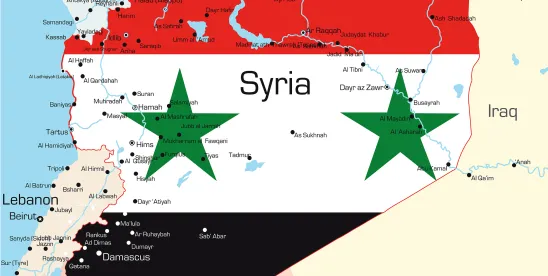On May 23, 2025, approximately five months after the Assad regime was overthrown, the Department of the Treasury’s Office of Foreign Assets Control (OFAC) officially issued Syria General License (GL) 25, which lifted the sanctions initially placed on Syria through a series of U.S. executive orders.[1] On June 30, 2025, President Trump further issued a new executive order (E.O.) — “Providing for the Revocation of Syria Sanctions” — terminating the Syria Sanctions Program and the national emergency with respect to Syria, effective July 1, 2025.[2]
The lifting of these sanctions marks the beginning of increased economic engagement between Syria and the United States, as well as a significant shift in U.S. foreign policy. The changes reflect improved conditions under Syria’s new president, Ahmed al-Sharaa, and aims to support a peaceful, unified, and stable Syria while holding accountable those responsible for past abuses.
These changes may additionally introduce multinational businesses into Syria that have long avoided the country in order to comply with U.S. law. But businesses should remain cautious and continue to conduct intensive due diligence related to any new business in the region. While the sanction program is changing, sanctions still remain in effect for individuals and entities related to Bashar al-Assad and his affiliates linked to Syria’s past proliferation activities, ISIS and Al-Qa’ida affiliates, Iran, and its proxies. Further, due to the historical links between Syria and many Syrian entities with Iran, due diligence also must address potential economic sanctions issues that could arise from indirect dealings with Iran or Iranian entities.
Background
Since 1979, the United States has designated Syria as a state sponsor of terrorism, leading to decades of U.S. restrictions on foreign assistance, bans on defense exports and sales, export controls of dual-use items, and other financial restrictions.[3] In 2004, pursuant to a series of executive orders beginning with E.O. 13338, OFAC designated certain individual Syrian persons and entities as Specially Designated Nationals (SDNs) based on determinations regarding terrorism, human rights violations, and other activities opposed to U.S. interests.[4]
Also in 2004, pursuant to E.O. 13338, the U.S. issued export controls prohibiting the export and reexport to Syria of certain products pursuant to the Export Administration Regulations (EAR) and the International Traffic in Arms Regulations (ITAR).[5] Exports of goods to Syria that are subject to EAR require a license, while defense articles subject to ITAR controls, like missiles, generally cannot be exported to Syria at all.[6]
In 2005, OFAC created the official Syrian Sanctions Regulations program, which implements all the U.S. legal authorities sanctioning Syria, including executive orders.[7] From 2006 to 2012, E.O.s 13399, 13460, 13572, 13573, 13582, 13606, and 13608 added more Syrian individuals to the sanctions program and to the SDN list.[8]
In April 2011, after the Syrian civil war began, E.O. 13582 focused sanctions on the entire Government of Syria, blocking the property of Syrian officials whom the U.S. State Department concluded to be responsible for human rights abuses, especially against Syrian citizens.[9] By blocking the property and assets of these officials, E.O. 13582 prohibited new U.S. investments in Syria and all approvals, financing, facilitation, and guarantees by U.S. persons with Syria. Additionally, it added further export controls on all exportations, reexportations, sales, and supplies of services to Syria by U.S. persons or anyone subject to U.S. jurisdiction to Syria, all importations of Syrian petroleum products, and all petroleum product transactions between U.S. persons and Syria.[10]
In May 2011, E.O. 13573 expanded sanctions to directly include then-President Bashar al-Assad and any senior officials of the Government of Syria, as determined by the Secretaries of the Treasury and State.[11]
In 2019, Congress passed the Caesar Syria Civilian Protection Act, which placed a secondary set of statutory sanctions on foreign persons and countries connected to the Assad regime’s import of certain goods, services, and technologies such as those related to the military, aviation, and natural resource industries.[12]
Since 2011, U.S. sanctions on Syria have shrunk Syria’s economy by over 60%, according to some estimates.[13]
Lifting Sanctions
A. General License 25 (GL 25)
To ease U.S. sanctions on Syria, OFAC and the U.S. State Department separately issued a license and waiver allowing transactions with Syrian businesses. OFAC’s GL 25 is a general license that lifts sanctions on Syria but simultaneously allows the U.S. to reauthorize those sanctions at any time.[14] Through GL 25, the U.S. has lifted the sanctions imposed by E.O.s 13338, and other executive orders from 2006 to 2012, and granted a general license to transact with certain Syrian individuals and businesses.[15] At the same time as GL 25’s issuance, the U.S. Department of State issued a waiver of the Caesar Syria Civilian Protection Act for 180 days, lifting the secondary set of statutory sanctions with revisitation after the 180 days.[16]
With the implementation of GL 25 and the Caesar Syria Civilian Protection Act Waiver, and continuing EAR/ITAR controls on certain goods sent to Syria, U.S. companies’ abilities to associate with Syrian businesses changed.
GL 25 allows U.S. companies to:
- Make investments in Syria.[17]
- Export services to Syria.[18]
- Import Syrian petroleum products.[19]
- Conduct petroleum product transactions with certain Syrians, including those in the Annex in GL 25.[20]
But GL 25 still prohibits U.S. companies from:
- Conducting transactions with blocked persons on the Specially Designated Nationals List.[21]
- Conducting transactions with entities which have ownership percentages of at least 50% by blocked persons on the Specially Designated Nationals List.[22]
- Conducting transactions with Syria that involve Russia, Iran, and North Korea.[23]
B. Executive Order Providing for the Revocation of Syria Sanctions
Additionally, effective July 1, 2025, President Trump, through his executive order “Providing for the Revocation of Syria Sanctions” (issued on June 30, 2025), terminated the following:
- The national emergency declared in Executive Order 13338 of May 11, 2004 (Blocking Property of Certain Persons and Prohibiting the Export of Certain Goods to Syria), and revoked that order;[24]
- Executive Order 13399 of April 25, 2006 (Blocking Property of Additional Persons in Connection With the National Emergency With Respect to Syria);[25]
- Executive Order 13460 of February 13, 2008 (Blocking Property of Additional Persons in Connection With the National Emergency With Respect to Syria);[26]
- Executive Order 13572 of April 29, 2011 (Blocking Property of Certain Persons with Respect to Human Rights Abuses in Syria);[27]
- Executive Order 13573 of May 18, 2011 (Blocking Property of Senior Officials of the Government of Syria),[28] and
- Executive Order 13582 of August 17, 2011 (Blocking Property of the Government of Syria and Prohibiting Certain Transactions with Respect to Syria).[29]
OFAC also removed over 500 individuals and entities from the Specially Designated Nationals and Block Persons list who were previously sanctioned. The full list is available here and includes Syriatel Mobile Telecom, the Commercial Bank of Syria, the Syrian Petroleum Company, and the Syria International Islamic Bank.[30] Notably, all Syrian financial institutions, including the Central Bank of Syria, have been removed from OFAC’s List of Specially Designated Nationals and Blocked Persons (SDN List).[31]
Therefore, effective July 1, 2025, U.S. persons are no longer prohibited from providing financial services to Syria, processing payments on behalf of third-country financial institutions involving Syrian financial institutions, or conducting transactions with the new Government of Syria and Syrian financial institutions, provided that none of the involved parties are on the SDN List.[32] This includes establishing correspondent banking relationships with Syrian financial institutions.[33] In line with the lifting of Syria sanctions, the Financial Crimes Enforcement Network issued exceptive relief, in late May 2025, to permit U.S. financial institutions to open and maintain correspondent accounts for the Commercial Bank of Syria.[34]
OFAC also removed the Syrian Sanctions Regulations, 31 CFR Part 542 (SySR) from the Code of Federal Regulations following the July 1, 2025, revocation. The OFAC Syria-related sanctions program has now become the Promoting Accountability for Assad and Regional Stabilization Sanctions (PAARSS) program.[35] The Executive Order also now allows the export of U.S.-origin food and medicine to Syria without a license from OFAC.[36] Previously, only U.S.-origin food and medicine classified as EAR99 could be exported to Syria, pursuant to specific procedures.
The Department of State separately announced that it will examine the potential full suspension of the temporarily suspended Caesar Act and that while the sanctions program is ending, sanctions remain in effect for individuals and entities related to the Bashar al-Assad regime.[37]
The order also authorizes waivers under the Syria Accountability Act, and the Chemical and Biological Weapons Control and Warfare Elimination Act, contingent on continued reform. It further directs agencies to review Syria’s designation as a State Sponsor of Terrorism and encourages coordinated action at the United Nations.
On July 7, 2025, the U.S. revoked the designation of al-Nusrah Front, also known as Hay’at Tahrir al-Sham (and other aliases), as a Foreign Terrorist Organization pursuant to section 219 (a)(6)(A) of the Immigration and Nationality Act (8 U.S.C. 1189(a)(6)(A)) and set the related notice for publication on July 8, 2025.[38]
What Companies Should Know
While the order opens the door for U.S. commercial engagement, it maintains restrictions against bad actors and affirms a policy of conditional engagement based on continued accountability and reform. In light of these requirements, companies looking to reengage with Syria or Syrian entities should keep in mind the following:
1. Continue to Screen Transactions for Compliance with Remaining Sanctions
While the lifting of sanctions in Syria may improve Syria’s economy through foreign engagement, U.S. companies should recognize the potential risk and ensure compliance with sanctions that remain in effect. Companies should vet all potential Syrian partners, counterparties, and intermediaries for past ties to the Assad regime, human rights abuses, terrorism, or narcotics trafficking (with a focus on Captagon drug trade connections) and run sanctions screening on all persons involved in any potential transaction.
2. Conduct Due Diligence for Potential Transshipments through Syria to Sanctioned Countries or Persons
Additionally, given historic ties to Iran, Syria-based transaction still need to undergo appropriate due diligence, as the country remains a potential transshipment point to Iran, which is under comprehensive sanctions.
Despite sanctions relief, many restrictions remain, including prohibitions on dealings with designated terrorist organizations, export controls for sensitive technologies (e.g., dual-use goods), and restrictions on certain financial transactions, banking access, and support for individuals tied to the former Assad regime.
3. Ensure Compliance Integrity
Maintain a robust compliance program. Be sure to perform due diligence on upstream suppliers and vendors if conducting business in Syria and implement traceability protocols and audit programs. The penalties for violating sanctions still exist and will be enforced. Document due diligence reports, maintain effective screening protocols for third parties, keep up to date on internal training on export control laws, anti-money laundering, and FCPA/anti-bribery laws. All of these steps will help keep you prepared for possible audits or inquiries by U.S. regulators
2025 Foley Summer Associate Emily March contributed to the research and drafting of this article.
[1] Press Release, U.S. Dep’t of the Treasury, Treasury Issues Immediate Sanctions Relief for Syria (May 23, 2025), https://home.treasury.gov/news/press-releases/sb0148.
[2] Press Release, U.S. State Dept, Ending the Syria Sanctions Program for the Benefit of the Syrian People (June 30, 2025), https://www.state.gov/releases/office-of-the-spokesperson/2025/06/ending-the-syria-sanctions-program-for-the-benefit-of-the-syrian-people/.
[3] State Sponsors of Terrorism, Bureau of Counterterrorism, https://www.state.gov/state-sponsors-of-terrorism/.
[4] Brochure, U.S. Dep’t of the Treasury, Off. of Foreign Assets Control, Syria Sanctions Program (Aug. 2, 2013), https://ofac.treasury.gov/media/6531/download?inline.
[5] Exec. Order No. 13338, 3 C.F.R. 13338 (2004).
[6] 15 C.F.R. § 742.9 (2025).
[7] Syria Sanctions, Off. of Foreign Assets Control, https://ofac.treasury.gov/sanctions-programs-and-country-information/syria-sanctions.
[8] Brochure, U.S. Dep’t of the Treasury, Off. of Foreign Assets Control, Syria Sanctions Program (Aug. 2, 2013), https://ofac.treasury.gov/media/6531/download?inline.
[9] Syria Sanctions, U.S. Dep’t of State, https://www.state.gov/syria-sanctions/.
[10] Id.
[11] Id.
[12] Fact Sheet from the Office of the Spokesperson, U.S. Dep’t of State (June 17, 2020), https://2017-2021.state.gov/caesar-syria-civilian-protection-act/.
[13] Abdulkader Husrieh, By Invitation, The Economist, May 17-23, 2025, at 14.
[14] Office of Foreign Assets Control, General License No. 25, U.S. Dep’t of the Treasury (May 23, 2025), https://ofac.treasury.gov/media/934306/download?inline.
[15] Id.
[16] Fact Sheet from the Office of the Spokesperson, U.S. Dep’t of State (June 17, 2020), https://2017-2021.state.gov/caesar-syria-civilian-protection-act/.
[17] Id.
[18] Id.
[19] Id.
[20] Id.
[21] Id.
[22] Id.
[23] Id.
[24] The White House, “PROVIDING FOR THE REVOCATION OF SYRIA SANCTIONS”, (June 30, 2025), https://www.whitehouse.gov/presidential-actions/2025/06/providing-for-the-revocation-of-syria-sanctions/.
[25] Id.
[26] Id.
[27] Id.
[28] Id.
[29] Id.
[30] Id. ; see also Press Release, Revocation of Syria Sanctions; Publication of Syria Frequently Asked Questions; Syria and Syria-related Designation Updates and Removals, Office of Foreign Assets Control (June 30, 2025), https://ofac.treasury.gov/recent-actions/20250630.
[31] U.S. Dep’t of Treasury, Office of Foreign Assets Control, #1221, Can U.S. financial institutions establish relationships with Syrian financial institutions, including the Central Bank of Syria? (June 30, 2025), https://ofac.treasury.gov/faqs/1221.
[32] Id.
[33] Id.
[34] Id.
[35] U.S. Dept’ of Treasury, Office of Foreign Assets Control, Promoting Accountability for Assad and Regional Stabilization Sanctions (PAARSS) CHANGES TO OFAC’S SYRIA SANCTIONS PROGRAM AS OF JUNE 30, 2025, (June 30, 2025), https://ofac.treasury.gov/sanctions-programs-and-country-information/paarss.
[36] U.S. Dep’t of Treasury, Office of Foreign Assets Control, #1222. Do I need a specific license from OFAC to export or reexport food or medicine to Syria?, Office of Foreign Assets Control (June 30, 2025), https://ofac.treasury.gov/faqs/1222.
[37] Press Release, U.S. State Dept, Ending the Syria Sanctions Program for the Benefit of the Syrian People (June 30, 2025), https://www.state.gov/releases/office-of-the-spokesperson/2025/06/ending-the-syria-sanctions-program-for-the-benefit-of-the-syrian-people/.
[38] U.S. Department of State, Public Notice 12762, Revocation of the Foreign Terrorist Organization Designation of al-Nusrah Front, also known as Hay’at Tahrir al-Sham (July 7, 2025), chrome-extension://efaidnbmnnnibpcajpcglclefindmkaj/https://public-inspection.federalregister.gov/2025-12720.pdf.







 />i
/>i

